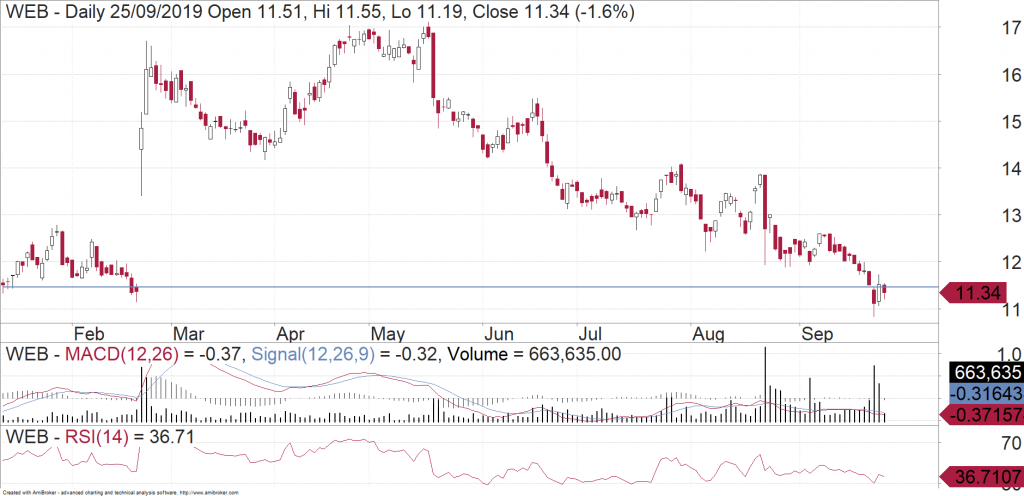Webjet (ASX:WEB) recently released their full year results and they contained some disappointing aspects. This contributed to the weakness in the share price post results release. After tumbling from $17 to $11, there could be an opportunity here. We have considered the organic growth opportunities in the B2B business, the challenges in the B2C segment, and the potential for further acquisitions.
WEB has two key segments – Business to Consumer (B2C) and Business to Business (B2B). B2C consists of Webjet which is Australia’s number one online travel agency and Online Republic which is a market leading specialist in the provision of online cruise, rental car and motorhome bookings.
Slowing Organic Growth for B2B Segment
The Company’s B2B business is called WebBeds. WebBeds is the world’s second largest and fastest growing accommodation supplier to the travel industry. It operates globally and essentially acts as an intermediary between hotels looking to fill hotel rooms and its clients looking to find rooms for their customers. The B2B segment reports under three regions: Europe; Americas, Middle East & Africa (AMEA); and Asia Pacific.
The Company has achieved scale for WebBeds via a combination of organic growth and acquisitions. The acquisitions of JacTravel and Destinations of the World (DOTW) were a major contributor to earnings growth for the B2B segment in FY19.
The trading update for the FY20 year to date (i.e. six weeks post 30 June 2019) suggests that organic growth rates for FY20 are expected to remain elevated. However, according to management expectations, the expected growth rate for B2B is expected to step down from FY19 levels of around +30%, to around +10%.
WEB has identified its Asian operations as a key organic growth opportunity. This is because the acquisition of DOTW meaningfully strengthened WEB’s Asia inventory.
Challenges for the B2C Segment
EBITDA performance for the B2C segment was below market expectations and weighed down by a slowdown in industry conditions. This resulted in bookings for the core Webjet.com business increasing by only 1%.
For FY20, EBITDA growth for the Webjet business is expected to be broadly in line with that for FY19 (+4%). Earnings growth is challenged by the Online Travel Agency (OTA) business increasingly showing signs of maturity. In turn, this would limit the extent to which margin expansion can be achieved. In context, margin expansion has been a key factor in the Company historically achieving double-digit EBITDA growth.
Opportunities to Utilise Balance Sheet Capacity
The Company retains a minimal net debt position of $23.7m (after funding the DOTW acquisition). This provides scope for capital management and acquisition opportunities. We expect acquisitions to be the Company’s main focus, with management pointing to a strong pipeline of acquisition opportunities in the B2B segment. In particular, the Company is aiming to increase its direct hotel contracts from ~30,000 to ~40,000. These now comprise ~55% of WebBeds sales and the clear benefit of direct contracts is that these generate higher margins.
Further acquisitions are likely to be well received, as the Company’s track record of integrating recent acquisitions (i.e. JacTravel and Destinations of the World) provide the Company with a framework to extract synergies for future acquisitions.
Fundamental View
We maintain a cautious view on WEB’s fundamentals. EPS growth estimates for FY20 (+22%* ) represents a step-down from the +30% EPS growth reported for FY19. Further, we consider that challenges in extracting EBITDA margin expansion in the B2C segment and a slowing organic growth profile for the B2B segment presents downside risk to consensus EPS growth estimates for FY20.
Charting View
The last few months has seen WEB continue to trend lower. It has now come right back to the gap created in February (horizontal line). This means that we could see some support come in. It is a positive sign that the shares bounced on the news of Thomas Cook entering liquidation, instead of being sold off. This means that perhaps they are now trying to find a low with all the bad news potentially being priced in. If WEB can spend a bit more time holding on to these levels, then we can start to be a bit more confident that the share price has found a low.

* This estimate includes the loss of earnings as a result of Thomas Cook entering into compulsory liquidation. Under its arrangement with Thomas Cook, WEB had over 3,000 direct hotel contracts available on the WebBeds platforms, which accounted for ~10% of WebBeds’ overall direct hotel contracts. Since Thomas Cook’s collapse, the Company has successfully sold these contracts into the rest of its B2B operations.




